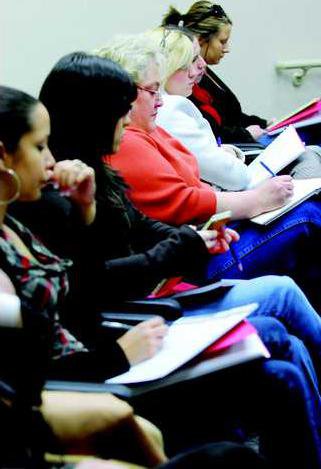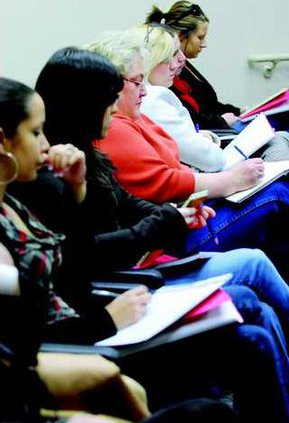Walter Rucker can remember when a Gainesville city truant officer put the fear of God into teenagers playing hooky from school.
The days of an officer taking truant kids off the streets and driving them back to school are long gone, but truancy cases remain commonplace in Hall County’s juvenile court. Judges Mary Carden and Cliff Jolliff hear about 100 cases of truant students each year, with children who rack up 20, 30, 40 or more unexcused absences from school.
“Eighty percent of the people in the criminal justice system are dropouts,” Rucker, an Gainesville attorney, said. With the local dropout rate hovering at around 25 percent, those who don’t finish school face a questionable future.
“We know that translates into loss of economic power,” Rucker said. “Naturally they’re going to become underachievers.”
Rucker was one of about 20 people who went through training Friday to become a volunteer guardian ad litum in the Truancy Intervention Program. The volunteers help juvenile court judges make informed decisions about what to do in truancy cases by attending court hearings and meeting with the children and their parents outside of court. The program is similar to the Court-
Appointed Special Advocate, or CASA, which assigns volunteers to work with children in deprivation cases.
The “TIP” volunteers, as they’re known, serve as the “eyes and ears” for the court, looking into the root causes of a child’s truancy, Carden said.
“Truancy is a symptom, not the underlying problem,” she said. “If we don’t find out why they’re missing school, we can’t fix the problem.”
Carden said school social workers and counselors do their part, but they don’t come to court unless there is a trial of the case, which leaves judges to rely on what parents and students tell them.
The TIP volunteers dig deeper and “give us the information we need to help us make the right decisions and do what’s right by the child,” Carden said.
Each volunteer commits to taking on at least two truancy cases per year involving children ages 11 to 14. The children are new to the juvenile court system and have not been placed on probation before.
While juvenile court hears the cases of teens up to age 16, the 11 to 14 age range is where the volunteers are needed.
“We know from experience if a child is missing a lot of school and reaches high school, you’ve lost that child,” Carden said. “Middle school is the time to reach that child.”
For TIP volunteers, that means asking the right questions, delving into a child’s home life, and identifying the problems, whether it is lack of supervision, health issues or substance abuse.
The task for volunteers is “unraveling why they’re not at school,” local attorney Sonny Sykes said. “Kids can be difficult to deal with until you find the key to dealing with them.”
Joe Holloway, a TIP volunteer since the program began in 1999, said the solutions can be as varied as the cases. A judge could order probation. Afterschool programs may be needed for better supervision. Some children may need medication. In some cases, placement in another home is the answer.
“Your job is to make recommendations to the court as to what you think would be appropriate for that child,” Holloway said.
Rucker said he believes volunteering to help stem truancy should pay dividends in the criminal justice system.
“I think if we do this, it’s not only going to increase attendance at school, but also improve the crime rate,” Rucker said.




